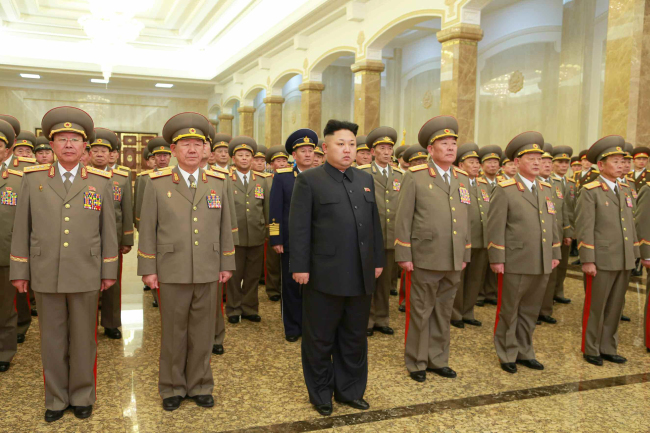North Korea has repeated its calls for the United States to cancel the annual South Korea-U.S. military drills in return for its nuclear moratorium in an apparent show of its desire for talks with Washington amid toughened U.S. economic sanctions against the isolated regime.
In a rare media interview on Friday, Hyon Hak-bong, the North’s ambassador to Britain, reiterated Pyongyang’s stance against the Key Resolve/Foal Eagle exercises to begin next month, saying the North was ready to take “responsible steps” to temporarily suspend its nuclear tests.
Washington has already dismissed Pyongyang’s proposal as an “implicit threat,” as it is exploring the full range of tools at its disposal ― as Sung Kim, a top U.S. envoy on North Korea policy, said, to get the North to change its course and stop its “destructive” policy choices.

North Korean leader Kim Jong-un pays respect to his deceased father and grandfather on Jan. 1. (Yonhap)
Seoul and Washington said they would press ahead with the “defense” drills. Seoul stressed that the issues of holding dialogue with Pyongyang and staging the annual drills should be “separate.” The North has long argued the drills are a rehearsal for a “nuclear war of invasion” against it.
Raising the pressure on the U.S. to accept the North’s proposal, Hyon also warned that no progress in any dialogue would be made and there would only be a threat of a nuclear war should there be military drills against an “interlocutor.”
Noting that in 1992, the U.S. stopped the allies’ “Team Spirit” exercise following North Korea’s demand, Hyon also said, “It is time for the U.S. to make a bold decision for peace and stability on the Korean Peninsula.”
On Sunday, the Rodong Sinmum, the daily of the North’s ruling Workers’ Party, also demanded that the U.S. cancel the drills. It argued that without suspending the plan for the drills, actual dialogue between the two Koreas and between the U.S. and North Korea were impossible.
“Should the U.S. cancel the drills as we proposed, there will be remarkable progress on the efforts to secure peace and stability not only on the Korean Peninsula, but also in Northeast Asia,” the daily said in a commentary.
Ahn Chan-il, the head of the World North Korea Research Center, raised the possibility that through the proposal for its nuclear moratorium, Pyongyang indicated that it was willing to bargain away its nuclear program and come out to the international community.
“My analysis may sound too naive, but the North ― after having watched the improvement in relations between the U.S. and Cuba ― appeared to have decided to negotiate with the U.S. and wanted to come forward to the outside world to ease its isolation,” he said.
“It could be a change in the North’s foreign policy course. The North could think that rather than sticking to its policy of nuclear armament, it would be better to negotiate with the U.S. over its nukes and move out to the world.”
However, the proposal could also be part of the North’s efforts to show that it has been making efforts toward dialogue with the U.S., said Kim Yong-hyu, North Korea expert at Dongguk University.
“The North seems to show that it is leading the situation in the current standoff with the U.S. rather than showing the world that it is being dragged by the U.S.,” he said. “It could also be attempting to accumulate evidence that it did try to improve relations with the U.S. through dialogue.”
By Song Sang-ho (sshluck@heraldcorp.com)





![[KH Explains] No more 'Michael' at Kakao Games](http://res.heraldm.com/phpwas/restmb_idxmake.php?idx=645&simg=/content/image/2024/04/28/20240428050183_0.jpg&u=20240428180321)
